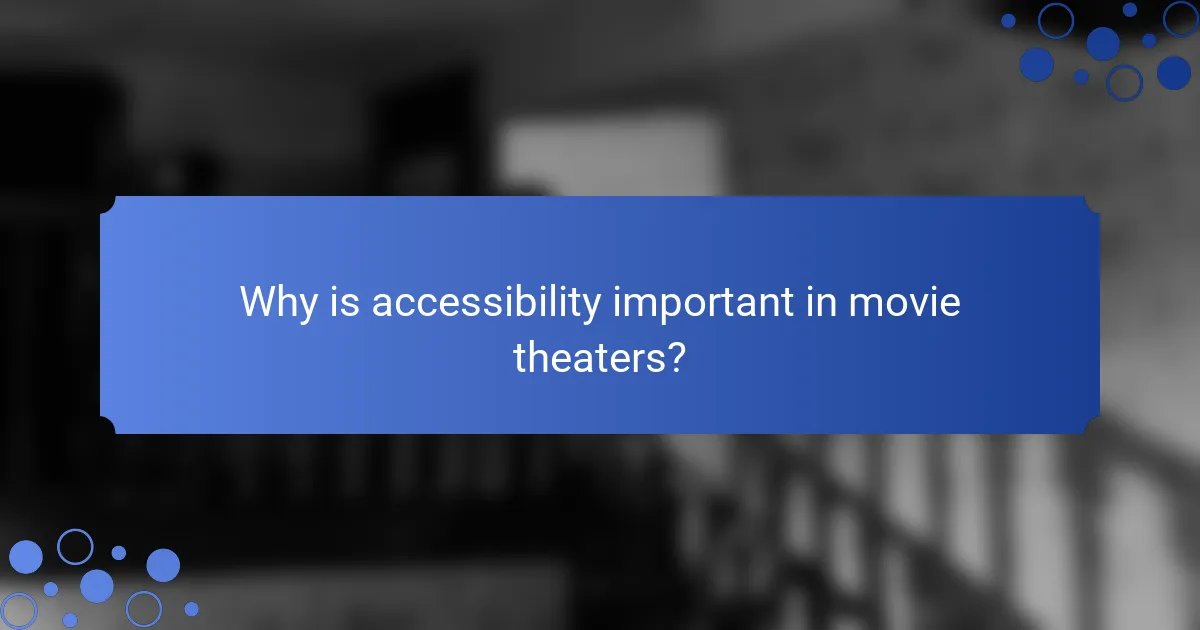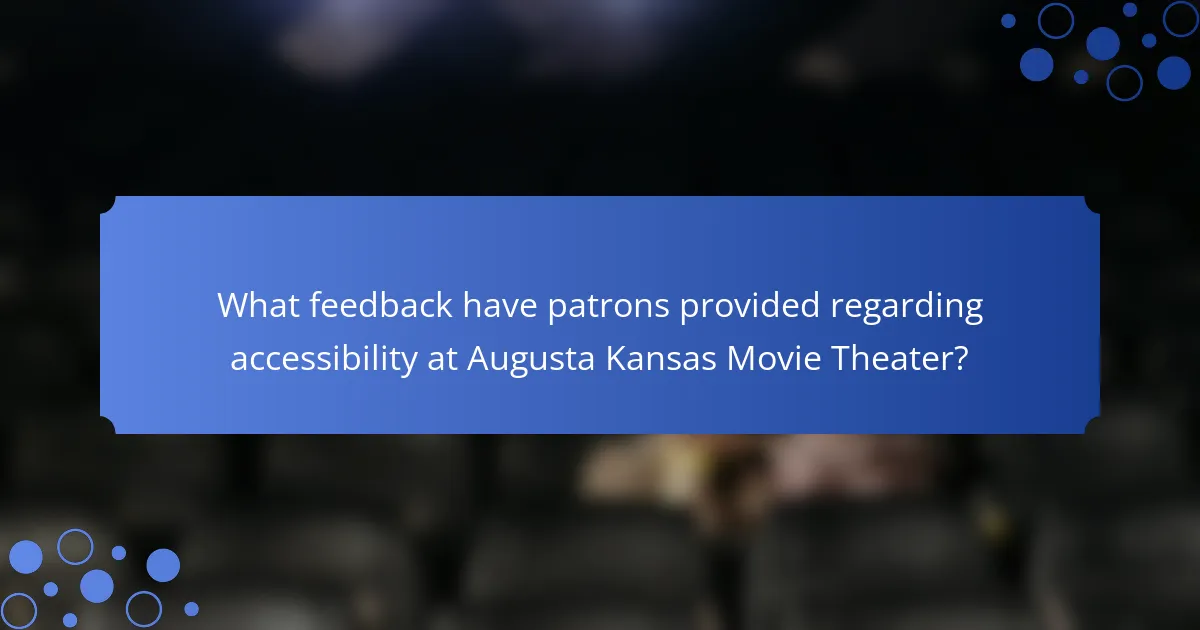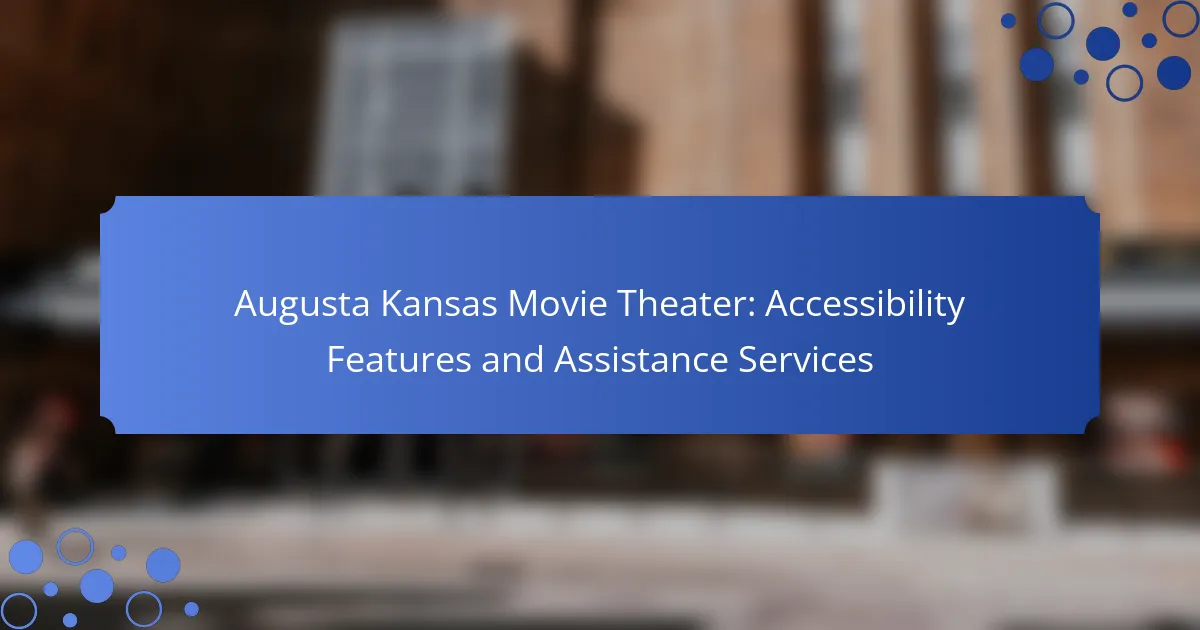The Augusta Kansas Movie Theater is equipped with various accessibility features designed to accommodate individuals with disabilities. These features include wheelchair access to all viewing areas, designated seating, assistive listening devices for guests who are hard of hearing, and accessible restrooms. The theater staff is trained to assist patrons with special needs, promoting an inclusive cinematic experience. While many patrons appreciate the available accessibility options, feedback indicates that improvements are needed in areas such as aisle width and signage for visually impaired guests. This article examines the accessibility features and assistance services available at the Augusta Kansas Movie Theater, highlighting both strengths and areas for enhancement.

What are the accessibility features of Augusta Kansas Movie Theater?
The Augusta Kansas Movie Theater offers several accessibility features. These include wheelchair access to all viewing areas. The theater provides designated seating for individuals with disabilities. Assistive listening devices are available for guests who are hard of hearing. Additionally, the facility has accessible restrooms. Staff members are trained to assist guests with special needs. The theater aims to ensure an inclusive experience for all patrons.
How do these accessibility features enhance the movie-going experience?
Accessibility features enhance the movie-going experience by ensuring inclusivity for all patrons. These features include closed captioning, audio descriptions, and wheelchair accessibility. Closed captioning allows deaf or hard-of-hearing individuals to follow the dialogue and sound cues. Audio descriptions provide visually impaired patrons with verbal narration of the visual elements on screen. Wheelchair accessibility ensures that individuals with mobility challenges can enter and navigate the theater comfortably. According to a study by the National Association of Theatre Owners, theaters with robust accessibility options see increased attendance from diverse audiences. This inclusivity fosters a welcoming environment, enhancing overall enjoyment of the movie experience.
What specific accommodations are available for individuals with mobility challenges?
Specific accommodations for individuals with mobility challenges include wheelchair-accessible seating, ramps, and elevators. Augusta Kansas Movie Theater provides designated seating areas for easy access. The theater ensures restrooms are equipped with accessible stalls. Staff members are trained to assist individuals with mobility needs. Additionally, assistive listening devices are available for those with hearing impairments. These features comply with the Americans with Disabilities Act (ADA) standards. The theater aims to create an inclusive environment for all patrons.
How does the theater ensure sensory-friendly viewing options?
The theater ensures sensory-friendly viewing options by offering specific screenings designed for individuals with sensory sensitivities. These screenings typically feature lower sound levels and adjusted lighting to create a more comfortable environment. Staff members are trained to assist guests with sensory needs. The theater may also allow for movement and noise during these screenings. Additionally, sensory-friendly kits, including noise-canceling headphones and fidget tools, are often available. These measures aim to provide an inclusive experience for all patrons.
What assistance services does Augusta Kansas Movie Theater provide?
Augusta Kansas Movie Theater provides various assistance services to enhance the movie-going experience. These services include wheelchair accessibility throughout the theater. They offer assistive listening devices for those with hearing impairments. The theater also provides closed captioning options for select films. Additionally, staff members are trained to assist guests with disabilities. These features ensure a more inclusive environment for all patrons.
How can patrons request assistance before or during their visit?
Patrons can request assistance before or during their visit by contacting the theater directly. They can call the theater’s customer service number to ask about specific needs. Additionally, patrons may visit the theater’s website for information on accessibility options. Many theaters also provide an email address for assistance requests. During their visit, patrons can speak to staff members at the ticket counter. Staff are trained to assist with various needs. Signage is often available to guide patrons to help areas. These methods ensure that patrons receive the support they require.
What training do staff members receive regarding accessibility services?
Staff members receive training on accessibility services to ensure compliance with the Americans with Disabilities Act (ADA). This training covers the identification of various disabilities and the appropriate assistance methods. Staff learn about available services such as wheelchair access and assistive listening devices. They are trained to communicate effectively with individuals requiring assistance. Role-playing scenarios are often included to enhance understanding. Staff members also learn about the importance of creating an inclusive environment. Regular updates on accessibility policies are provided to keep staff informed. This comprehensive training ensures that all patrons receive the necessary support.

Why is accessibility important in movie theaters?
Accessibility is important in movie theaters to ensure that all individuals, including those with disabilities, can enjoy the cinematic experience. It promotes inclusivity and equal access to entertainment. According to the Americans with Disabilities Act (ADA), public accommodations, including theaters, must provide accessible facilities. This includes wheelchair ramps, designated seating, and assistive listening devices. Statistics show that over 61 million adults in the U.S. live with a disability, highlighting the need for accessible options. Accessibility features enhance the overall experience for everyone, fostering a welcoming environment.
How does accessibility impact community engagement?
Accessibility significantly enhances community engagement by ensuring all individuals can participate fully. When venues like the Augusta Kansas Movie Theater are accessible, they invite diverse community members. This inclusivity fosters a sense of belonging among residents. Studies show that accessible facilities increase attendance and participation rates. For instance, the National Council on Disability reports that accessible public spaces lead to higher community involvement. Therefore, improved accessibility directly correlates with increased engagement in community activities.
What role does inclusivity play in enhancing the theater’s audience?
Inclusivity plays a crucial role in enhancing the theater’s audience by ensuring that diverse groups can participate. It allows individuals from various backgrounds to experience performances without barriers. This leads to increased attendance and engagement from underrepresented communities. Research indicates that inclusive theaters see a 30% rise in audience numbers. Additionally, inclusivity fosters a sense of belonging among patrons. When audiences feel represented, they are more likely to return and recommend the theater to others. This creates a vibrant community atmosphere that benefits both the theater and its attendees.
How can accessibility features influence patron loyalty?
Accessibility features can significantly enhance patron loyalty. When a movie theater provides accessible options, it fosters an inclusive environment. This inclusion encourages repeat visits from patrons who may have disabilities. Research indicates that 71% of people with disabilities are more likely to return to a business that is accessible. Furthermore, accessibility features improve overall customer experience for all patrons. Positive experiences lead to word-of-mouth referrals and increased customer retention. The presence of such features also aligns with social responsibility, enhancing the theater’s reputation. Thus, investing in accessibility not only benefits patrons but also strengthens business loyalty.
What are the legal requirements for accessibility in theaters?
The legal requirements for accessibility in theaters include compliance with the Americans with Disabilities Act (ADA). The ADA mandates that theaters must provide accessible seating options for individuals with disabilities. This includes designated wheelchair spaces and companion seating in various areas of the theater.
Theaters are also required to ensure that their facilities, such as restrooms and entrances, are accessible. This includes features like ramps, handrails, and appropriate signage. Additionally, theaters must offer assistive listening devices to accommodate patrons with hearing impairments.
Failure to comply with these requirements can lead to legal action and penalties. The Department of Justice oversees enforcement of the ADA, ensuring that public accommodations, including theaters, meet accessibility standards.
How does Augusta Kansas Movie Theater comply with these regulations?
Augusta Kansas Movie Theater complies with accessibility regulations by implementing various features. The theater provides wheelchair-accessible seating and restrooms. Staff members are trained to assist patrons with disabilities. They offer audio description services for visually impaired guests. Closed captioning is available for all films. The theater also ensures clear pathways and signage for easy navigation. Regular audits are conducted to maintain compliance with the Americans with Disabilities Act (ADA). These measures demonstrate the theater’s commitment to accessibility and inclusivity.
What are common misconceptions about theater accessibility laws?
Common misconceptions about theater accessibility laws include the belief that they only apply to physical disabilities. In reality, accessibility laws cover various disabilities, including visual and auditory impairments. Another misconception is that all theaters are fully compliant with accessibility laws. Many theaters still lack the necessary features, despite legal requirements. Some people think that accessibility accommodations are optional for theaters. However, the Americans with Disabilities Act mandates these accommodations. Additionally, there is a belief that accessibility features are only for new theaters. Existing theaters are also required to update their facilities to meet accessibility standards. Misunderstandings about the extent of accommodations often lead to the assumption that only certain types of assistance are available. In fact, theaters must provide a range of services, including captioning and audio descriptions.

What feedback have patrons provided regarding accessibility at Augusta Kansas Movie Theater?
Patrons have provided mixed feedback regarding accessibility at Augusta Kansas Movie Theater. Some patrons appreciate the availability of wheelchair ramps and accessible seating options. Others have expressed concerns about the narrow aisles, making navigation difficult for those with mobility aids. Additionally, some feedback highlights the need for clearer signage to assist visually impaired guests. Overall, while there are positive aspects, improvements are needed to enhance the overall accessibility experience.
How does the theater gather feedback on its accessibility features?
The theater gathers feedback on its accessibility features through surveys and direct communication. Surveys are distributed to patrons after their visits. These surveys include specific questions about accessibility experiences. The theater also encourages patrons to share feedback via its website and social media. Staff members engage with customers to collect verbal feedback during visits. Additionally, the theater hosts focus groups with community members. These methods ensure diverse input on accessibility improvements. Gathering feedback helps the theater enhance its services for all patrons.
What common themes emerge from patron feedback?
Common themes from patron feedback include the importance of accessibility features, quality of customer service, and overall experience. Patrons frequently highlight the need for wheelchair accessibility and designated seating. Many comments emphasize the helpfulness of staff in assisting individuals with disabilities. Feedback often points to the cleanliness and maintenance of facilities as crucial for a positive experience. Additionally, patrons appreciate the variety of assistance services offered. The availability of audio descriptions and captioning is often mentioned as a significant benefit. Overall, feedback indicates that enhancing accessibility greatly improves patron satisfaction.
How has the theater adapted based on customer suggestions?
The theater has adapted by implementing various customer suggestions to enhance the viewing experience. Feedback indicated a demand for improved accessibility features. In response, the theater installed wheelchair ramps and designated seating areas. Customers also suggested more sensory-friendly screenings. Consequently, the theater now offers specific showtimes with adjusted lighting and sound levels. Additionally, staff training was enhanced to better assist patrons with disabilities. These adaptations reflect the theater’s commitment to customer feedback and inclusivity.
What are some best practices for ensuring accessibility in movie theaters?
Best practices for ensuring accessibility in movie theaters include providing wheelchair-accessible seating. Theaters should also offer assistive listening devices. Visual aids, such as closed captioning, enhance the experience for those with hearing impairments. Staff training on accessibility needs is crucial for effective assistance. Clear signage indicating accessible features is necessary for navigation. Regular maintenance of accessibility equipment ensures functionality. Engaging with the community for feedback helps improve services. Compliance with the Americans with Disabilities Act (ADA) guidelines is essential for legal standards.
How can theaters continuously improve their accessibility features?
Theaters can continuously improve their accessibility features by regularly assessing and updating their facilities. This includes implementing feedback from patrons with disabilities. They should invest in training staff on accessibility protocols. Theaters can also enhance technology, such as assistive listening devices and captioning services. Regular audits of physical spaces ensure compliance with accessibility standards. Collaboration with local disability organizations can provide insights for improvement. Additionally, marketing strategies should highlight accessible offerings to reach a broader audience. These practices can lead to a more inclusive environment for all guests.
What resources are available for theaters looking to enhance accessibility?
Theaters looking to enhance accessibility can access various resources. Organizations like the Americans with Disabilities Act (ADA) provide guidelines for compliance. The National Endowment for the Arts offers grants for accessibility projects. The Kennedy Center’s “Accessibility in the Arts” initiative provides training and resources. Online platforms like the Accessibility Toolkit offer best practices and tools. Additionally, local disability advocacy groups can provide insights and support. These resources help theaters create inclusive environments for all patrons.
Augusta Kansas Movie Theater is the primary entity discussed in the article, which focuses on its accessibility features and assistance services. The theater provides wheelchair access, designated seating, assistive listening devices, and sensory-friendly screenings to ensure an inclusive experience for all patrons. Key topics include the importance of accessibility in enhancing community engagement, compliance with the Americans with Disabilities Act (ADA), and feedback from patrons regarding their experiences. The article also outlines best practices for theaters to continuously improve accessibility and highlights resources available for enhancing these features.
